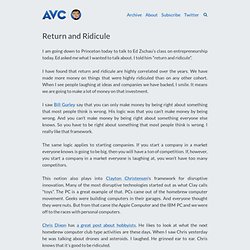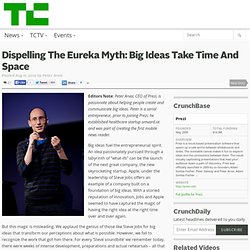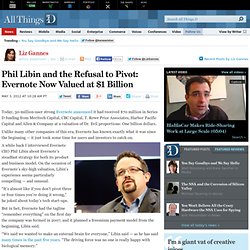

Chris Dixon. False-positives of Silicon Valley. Why Most Ideas are Worthless. Maybe it's the Facebook craze, or the warped view of entrepreneurialism that Hollywood and mainstream media have created.

For ages, young and hopeful entrepreneurs have embraced the fallacy that great ideas are the root of entrepreneurial success and instant wealth. People say, "If only I would have thought of that, I'd be rich! " Those of us who have built businesses know that success is rarely about the breakthrough idea. Clearly, a good idea is important, but it's just not the source of limitless riches. Real entrepreneurial success most often comes from hard work, risk-taking, and developing a product or solution that creates real value for customers.
Working with CEOs, investors, and entrepreneurs to build new businesses, we've found that many initial ideas are frankly not worth much. Far more important is a rock-solid business model that creates value for a customer, especially relative to existing solutions. Don't be afraid to share your idea. 1. 2.
What's the best launch strategy for a web startup. Reversing the Decline in Big Ideas - Max Marmer. Many venture capitalists are up in the arms because their returns are down, their funds are drying up, and there appear to be a declining number of entrepreneurs pursuing big ideas.

They’ve turned to blaming angel investors for encouraging “an entire generation of entrepreneurs [to build] dipshit companies and hoping that they sell to Google for $25 million.” They say, “this ‘think small’ attitude is driving entrepreneurs who may otherwise build the next Google or Microsoft to create something much less interesting instead.” And this has implications for the whole ecosystem because, “then everyone loses. No IPO. No 20,000 tech jobs. Unfortunately, venture capitalists have mixed up their causality. These founders don’t want to change to world. [Note: This is the second post of the Transformational Entrepreneurship series. This is not a bad thing for the startup ecosystem or the economy.
So who is to blame for the lack of big, transformational ideas? But times change. Old Ideas Are Better Than The Idea You Just Thought Of. Editor’s note: Jake Knapp is a design partner at Google Ventures where he helps startups with product strategy and design.

Follow him on Twitter @jakek. It drives me crazy every time I hear about Mailbox, the fancy-pants email app that Dropbox bought for a gazillion dollars. I mean, come on, it’s such an obvious idea — the app’s killer feature is “email snoozing.” It’s basically organized procrastination, and it’s been around since David Allen’s Getting Things Done, if not longer.
There’s even been a plug-in called Boomerang for years that allows you to snooze your email in the browser. Return and Ridicule. I am going down to Princeton today to talk to Ed Zschau's class on entrepreneurship today.

Ed asked me what I wanted to talk about. I told him "return and ridicule". Dispelling The Eureka Myth: Big Ideas Take Time And Space. Editors Note: Peter Arvai, CEO of Prezi, is passionate about helping people create and communicate big ideas.

Peter is a serial entrepreneur, prior to joining Prezi, he established healthcare startup omvard.se and was part of creating the first mobile news reader. Big ideas fuel the entrepreneurial spirit. An idea passionately pursued through a labyrinth of “what-ifs” can be the launch of the next great company, the new skyrocketing startup. Apple, under the leadership of Steve Jobs offers an example of a company built on a foundation of big ideas. With a storied reputation of innovation, Jobs and Apple seemed to have captured the magic of having the right idea at the right time over and over again.
But this magic is misleading. This is the most important lesson aspiring startups and entrepreneurs can learn from Jobs and other big thinkers: how to give space and time to discover, explore and convey big ideas. We live in a world where people are sharing more ideas than ever. Phil Libin's Evernote Now Valued at $1 Billion - Liz Gannes. Today, 30-million-user strong Evernote announced it had received $70 million in Series D funding from Meritech Capital, CBC Capital, T.

Rowe Price Associates, Harbor Pacific Capital and Allen & Company at a valuation of Dr. Evil proportions: One billion dollars. Unlike many other companies of this era, Evernote has known exactly what it was since the beginning — it just took some time for users and investors to catch on. A while back I interviewed Evernote CEO Phil Libin about Evernote’s steadfast strategy for both its product and business model.